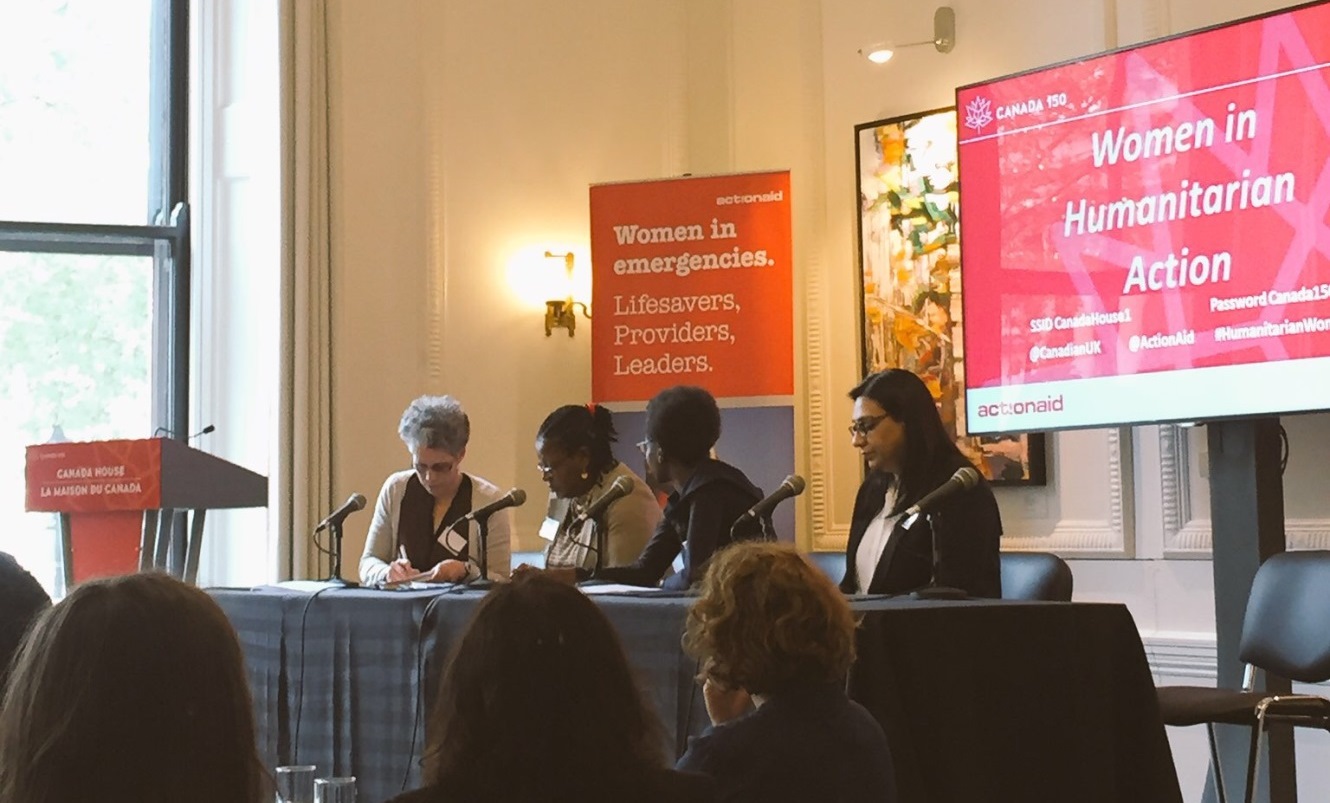“Women are usually the first to respond to emergencies. This leadership goes unrecognised, undervalued and often undermined.” Sonya Ruparel, the deputy Humanitarian Director at ActionAid International, introduced the Women in Humanitarian Action event hosted at Canada House by challenging the perception of women as solely those worst hit by emergencies.
The event was held to discuss the role of women in humanitarian action. During the event, a report co-authored by ActionAid International and Care International, was launched on ‘How can humanitarian organisations encourage more women in surge?’ It recognises the vital role played by women in emergencies, and makes recommendations to remove barriers that stop women from bringing their skills and experience to humanitarian response.
Women first responders share their insights
Do women do it better? This was the question put by Dorcas Erskine, Director of Policy, Advocacy and Programmes at ActionAid UK to Louisiane Nazaire, a founder of KPGA/OFTAG, a social movement organisation in the Grand Anse region of Haiti, and Zahida Fizza Kabir, the executive director of SAJIDA Foundation, an NGO in Bangladesh.
Louisiane described how KPGA/OFTAG responded to Hurricane Matthew, which struck Haiti in October 2016. “We were already well established within the communities to respond to the emergency. The women were well organised to respond to the disaster.”
She noted that this was as a result of lessons learnt after the earthquake that struck Haiti in 2010. She said: “The earthquake was a catalyst for us, we saw the need to train women. We feel that the result with the response to Hurricane Matthew has been a significant improvement. We sit together and it is us who decide what we do and where we do it.
“We believe the status of women is becoming more recognised. It’s a slow process and we are working on this. All our activities are women-led. It’s women who know the need, have the networks and the connections. Women-led organisations are able to respond differently.”
Zahida agreed: “Women shouldn’t be seen as just recipients, they should be put in decision-making positions.”
She described the connection between empowering local organisations to respond to emergencies, and how that enables women to participate in the response. “Local organisations are organic and work brilliantly as first responders as they are already in the community and have long-term engagement with them. They can be sensitive to the needs of the local community.
If we engage local organisations it paves the way for women to engage in humanitarian action better.”
How can humanitarian organisations encourage more women in surge?
In the light of Louisiane and Zahida’s insights, the event participants were invited to discuss the report in groups and highlight areas that they agreed or would like to challenge.
The report was based on interviews with women who have taken on roles in humanitarian surge for number of different agencies. It highlights concerns around personal safety and security, to childcare, personal hygiene and self-confidence. The report goes on to make recommendations to address these barriers in organisations’ surge policies and practice, to increase the participation of women in surge.
This led to a positive discussion from the importance of standard operating procedures to buddy systems. The participants - from a range of civil society organisations, UK government and the Canadian High Commission - widely welcomed the findings of the report and its recommendations.
Amelia Rule from Care summarised the discussion by applauding the fact that this report will increase the visibility of the issues, rather than leaving them to be discussed behind closed doors with only female colleagues.
Women’s protection in humanitarian response
Finally, Sara Pantuliano, a managing director at ODI, chaired a panel discussion about women’s protection in humanitarian and development contexts, and how these scenarios can intertwine.
Catherine Godin, the Deputy Permanent Representative to Canada’s Mission to the UN in Geneva, noted: “The scale of the problem of GBV is enormous. There’s a high level of political support to tackle this.”
Richard Miller, the Humanitarian Director for ActionAid International, said: “For ActionAid, women’s rights is at the heart of our development and humanitarian responses. The first thing is to shift the narrative of women’s vulnerability to their resilience.”
Lydia Stone, a Women, Peace and Security Advisor with DFID, discussed the challenges that women and girls face during protracted crises. “They exacerbate existing vulnerabilities that are already there, leading to Increases in maternal mortality and negative coping strategies like early child marriage.” She described the solutions that DFID is working towards, including challenging negative gender norms and working with women as agents of change.
Dr Marsha Henry, the Deputy Director of the Centre for Women, Peace and Security, raised the issue that reliance on local women’s organisations increases their workload. “I’m not sure women’s organisations can take on any more work. Although they are amazingly innovative there is this ongoing depletion of emotional and economic resources. We need to address this additional burden.”
The discussion was brought to a close by Sara, who observed: “Crisis can also be an opportunity to redefine gender roles.”
To find out more on the role of women in surge, read the full report: How can humanitarian organisations encourage more women in surge?

